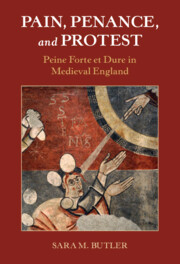Book contents
- Pain, Penance, and Protest
- Studies in Legal History
- Pain, Penance, and Protest
- Copyright page
- Contents
- Tables
- Acknowledgments
- Table of Statutes
- Abbreviations
- Introduction
- 1 Peine Forte et Dure: The Medieval Practice
- 2 Standing Mute in the Courts of Medieval England
- 3 Due Process and Consent to Jury Trial
- 4 Peine Forte et Dure as Barbarity? Putting the Practice in Context
- 5 Why Stand Mute?
- 6 Standing Mute as Imitatio Christi
- 7 Rejecting the Jury, Rejecting the Common Law, Rejecting the King
- Conclusion
- Bibliography
- Index
6 - Standing Mute as Imitatio Christi
Published online by Cambridge University Press: 19 November 2021
- Pain, Penance, and Protest
- Studies in Legal History
- Pain, Penance, and Protest
- Copyright page
- Contents
- Tables
- Acknowledgments
- Table of Statutes
- Abbreviations
- Introduction
- 1 Peine Forte et Dure: The Medieval Practice
- 2 Standing Mute in the Courts of Medieval England
- 3 Due Process and Consent to Jury Trial
- 4 Peine Forte et Dure as Barbarity? Putting the Practice in Context
- 5 Why Stand Mute?
- 6 Standing Mute as Imitatio Christi
- 7 Rejecting the Jury, Rejecting the Common Law, Rejecting the King
- Conclusion
- Bibliography
- Index
Summary
Martyrdom is the running thread in this study. Chapter 6 turns its focus to the definitive martyr, Jesus Christ, whose stoic behavior at the Passion established a way forward for those who stood mute. When Herod summoned Jesus before him, the divine prisoner also stood mute. His silence functioned as a means of protest, an interpretation familiar to English communities, who watched the drama unfold annually in the mystery plays. Similarly, depictions of the ancient martyrs also presented silence and passivity as models for resistance. These narratives reinforced the notion that only a heroic martyr stood mute in a court of common law. The world of literature also had much to say on the subject of peine forte et dure. Analysis of works such as Chasteau d’Amour, the Seven Sages of Rome, and Bevis of Hampton all clarify that hard prison was a sentence inflicted by an unmerciful, and often distinctly unchristian, authority. Nonetheless, these stories place peine forte et dure in a positive light: the intense suffering supplies the falsely accused with the ideal surroundings to perform imitatio Christi (imitation of Christ), thus assuring his salvation.
- Type
- Chapter
- Information
- Pain, Penance, and ProtestPeine Forte et Dure in Medieval England, pp. 303 - 347Publisher: Cambridge University PressPrint publication year: 2021

